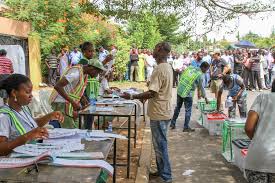By Ade Martins-
Millions of Nigerians have headed back to the polls for the gubernatorial elections amid tensions after last month’s disputed presidential vote.
New governors are being chosen for 28 of Nigeria’s 36 states on Saturday in the face of ongoing tension surrounding opposition continues to reject the victory of President-elect Bola Tinubu from the West African nation’s ruling party.
Africa’s most populous nation will be electing hundreds of state assembly lawmakers and governors in one of the most competitive governorship elections in a long time.
Governors in Nigeria control large aspects of the states resources , and often have access to billions of dollars, many of them eventually stealing money to suit their own pursuits.
Nigeria’s constitution grants a lot of powers to the governors, who are are immune from prosecution of any kind throughout their four-year tenure with a two-term limit.
The powers of the governors notwithstanding, polls have shown many in the West African nation do not have a high level of interest in the election and performance of governors, a trend analysts have said affects the level of accountability across the states.
Polling units were to be open from 8:30am (07:30 GMT) and close by 2:30pm (13:30 GMT) though delays are frequent and voters in line before closing time should still be able to vote. On Friday, armed security forces were seen patrolling the streets across the states where elections were to be held.
“Ahead of the elections, the security situation across the country appears tense, with reports of violence, kidnap and assassination in several states,” Situation Room, a coalition of civil society groups, said in a statement.
At a security meeting in Nigeria’s capital this week, Nigeria’s National Security Adviser Babagana Monguno said security forces have been deployed in all violence hotspots and officials do not envisage any major security threat.
“We must allow everyone to exercise their fundamental rights as citizens of this country. Anybody who is itching to undermine this process should please think again,” said Monguno.
Nigeria’s development has been hampered by endemic corruption and bad governance, involving governors in many cases.
Nigeria’s constitution grants enormous powers to the governors, yet they are immune from any form of prosecution throughout their four-year tenure with a two-term limit.
The powers of the governors notwithstanding, polls have shown many in the West African nation do not have a high level of interest in the election and performance of governors, a trend analysts have said affects the level of accountability across the states.
.The credibility of INEC has been critical issue following the presidential elections, with many calling on its boss, Mahmood Yakubu to step down.
Three political parties have emerged as frontrunners among the 18 filing governorship candidates in the 28 states. And although there are a record 87.2 million registered voters, analysts fear a repeat of the low participation in last month’s presidential vote which recorded a 26.7 percent voter turnout rate, the lowest in Nigeria’s history.
In the capital, Abuja, Kate Imadu, 26, was among many who could not vote in the presidential election despite waiting all day and into the night to cast her vote. That has made her less interested in travelling to her town in Cross River state to vote for the next governor, she said.
“What is the need of travelling when I couldn’t vote here during the presidential election?” Imadu asked, echoing the frustration of many others.
Nigeria’s Independent National Electoral Commission has promised to address challenges that arose in last month’s election, such as the delays in voting and uploading of results, which opposition parties alleged caused the disenfranchisement of voters and the manipulation of results.
“We must work harder to overcome the challenges experienced in the last election (as) nothing else will be acceptable to Nigerians,” Mahmood Yakubu, head of the electoral body, told officials in Abuja




